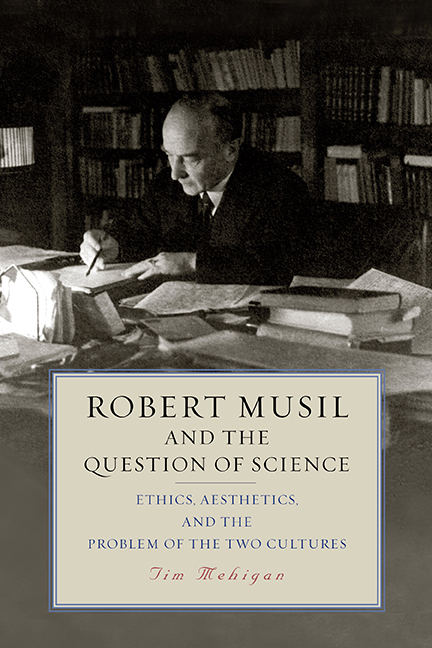Book contents
- Frontmatter
- Contents
- Preface
- Introduction: Musil’s Intellectual Position
- Part I Musil and the Two Cultures
- Part II Aesthetics and Ethics in the Context of the Two Cultures
- Conclusion: “A General Secretariat of Precision and Soul”: Ethics, Knowledge, and Literature after the Fourth Revolution 149
- References
- Index
- Frontmatter
- Contents
- Preface
- Introduction: Musil’s Intellectual Position
- Part I Musil and the Two Cultures
- Part II Aesthetics and Ethics in the Context of the Two Cultures
- Conclusion: “A General Secretariat of Precision and Soul”: Ethics, Knowledge, and Literature after the Fourth Revolution 149
- References
- Index
Summary
IN 1977, WHEN POSTMODERNISM was being received into American universities, Gerald Graff wrote an article in the American Scholar under the title “Fear and Trembling at Yale.” “It is possible,” he wrote, “that the true source of the malaise of current criticism is not so much epistemological or ontological as institutional, that it is a reflection of the confusion of the literature department… .” He went on to say: “Perhaps we have not really lost our capacity to interpret literary texts with relative correctness, but simply lost interest in this project. If so, it is not the metaphysical groundlessness of criticism that is at issue, but its pointlessness, at a moment when the humanists do not seem to know what they are trying to do” (Graff 1977, 476). Of course, the groundlessness of metaphysics, formally conceded by Heidegger, has been familiar to us for a long time. What we knew less in the 1970s, or did not wish to acknowledge, was that art and literary criticism are groundless for the same reasons. For a time, Gadamer's hermeneutics and Adorno's “material aesthetic” had us hoping for a final-hour reprieve. When neither strategy, nor any other like it, could legitimize criticism and thereby prevent the fall of the sovereign critic, the concession that criticism has no provable ground was less remarkable than the fact that, virtually overnight, it was universally proclaimed. It was French scholars, reading Heidegger and Nietzsche—German philosophers widely disdained in the immediate postwar period—who first drew attention to the fall of criticism by announcing the arrival of anti-exegetical practices such as “deconstruction” and “discourse analysis” in view of “the death of the author” and the “logocentric,” if not “phallocentric,” predisposition of texts. What they conveyed to us in sometimes brilliant, sometimes verbosely impenetrable prose, was that attempts since the Enlightenment to make reason the basis for our sense of ourselves and our institutions are part of a control reflex issuing from reason itself. Reason, accordingly, cannot be used to legitimate what derives from reason, which ends up being almost everything that we take for granted in modernity, including the critical faculty. The recognition that we cannot use reason to legitimate our institutions, nor any other aesthetic value that rides with them, was the public event we now call postmodernism.
Information
- Type
- Chapter
- Information
- Robert Musil and the Question of ScienceEthics, Aesthetics, and the Problem of the Two Cultures, pp. 79 - 91Publisher: Boydell & BrewerPrint publication year: 2020
